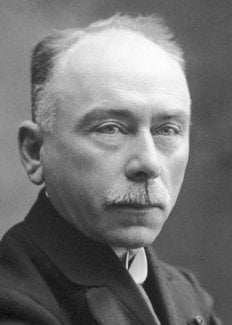Jules Bordet
Biographical
 Jules Bordet was born in Soignies, Belgium, on June 13, 1870. He was educated in Brussels where he graduated as Doctor of Medicine in 1892. In 1894 he went to Paris to work at the Pasteur Institute until 1901 when he returned to Belgium to found the Pasteur Institute, Brussels. He has been Director of the Belgian Institute since its inception (honorary since 1940) and Professor of Bacteriology, University of Brussels, since 1907 (honorary since 1935).
Jules Bordet was born in Soignies, Belgium, on June 13, 1870. He was educated in Brussels where he graduated as Doctor of Medicine in 1892. In 1894 he went to Paris to work at the Pasteur Institute until 1901 when he returned to Belgium to found the Pasteur Institute, Brussels. He has been Director of the Belgian Institute since its inception (honorary since 1940) and Professor of Bacteriology, University of Brussels, since 1907 (honorary since 1935).
Bordet’s early studies showed that antimicrobic sera include two active substances, one existing before immunization, known as alexine, and the other a specific antibody created by vaccination: he developed a method of diagnosing microbes by sera. In 1898, he discovered haemolytic sera and showed that the mechanism of their action on foreign blood is similar to that by which an antimicrobic serum acts on microbes and, furthermore, that the reactions of the sera are colloidal in nature. He has contributed much towards the understanding of the formation of coagulin and also anaphylactic poisons. Together with Gengou (in 1906), he cultivated B.pertussis and laid the foundations of the generally accepted opinion that this organism is the bacterial cause of whooping cough. In addition to his being an acknowledged world authority in many branches of bacteriology, Bordet was considered to be a great exponent and worker on immunology. He was the author of Traité de l’Immunité dans les Maladies Infectieuses (2nd ed., 1939) (Treatise on immunity in infectious diseases) and a great number of medical publications.
Bordet was a permanent member of the Administrative Council of Brussels University, he was President of the First International Congress of Microbiology (Paris, 1930), and Past President of the Premier Council of Hygiene of Belgium, the Scientific Council of the Pasteur Institute of Paris and the Belgian Academy of Medicine. He was Doctor, honoris causa, of the Universities of Cambridge, Paris, Strasbourg, Toulouse, Edinburgh, Nancy, Caen, Montpellier, Cairo, Athens, and Quebec. He was a member of the Belgian Royal Academy, the Royal Society (London), the Royal Society of Edinburgh, the Academy of Medicine (Paris), the National Academy of Sciences (U.S.A.), and many other academies and societies. Bordet gained many awards during his career, including the Grand Cordon de l’Ordre de la Couronne de Belgique (1930), the Grand Cordon de l’Ordre de Léopold (1937), the Grand Croix de la Légion d’Honneur (1938), and public honours of Rumania, Sweden and Luxemburg.
In 1899 Bordet married Marthe Levoz. They had one son, Paul,who succeeded his father as Chief of the Pasteur Institute in Brussels and also as Professor of Bacteriology, and two daughters. Jules Bordet died on April 6, 1961.
This autobiography/biography was written at the time of the award and first published in the book series Les Prix Nobel. It was later edited and republished in Nobel Lectures. To cite this document, always state the source as shown above.
Nobel Prizes and laureates
Six prizes were awarded for achievements that have conferred the greatest benefit to humankind. The 14 laureates' work and discoveries range from quantum tunnelling to promoting democratic rights.
See them all presented here.
